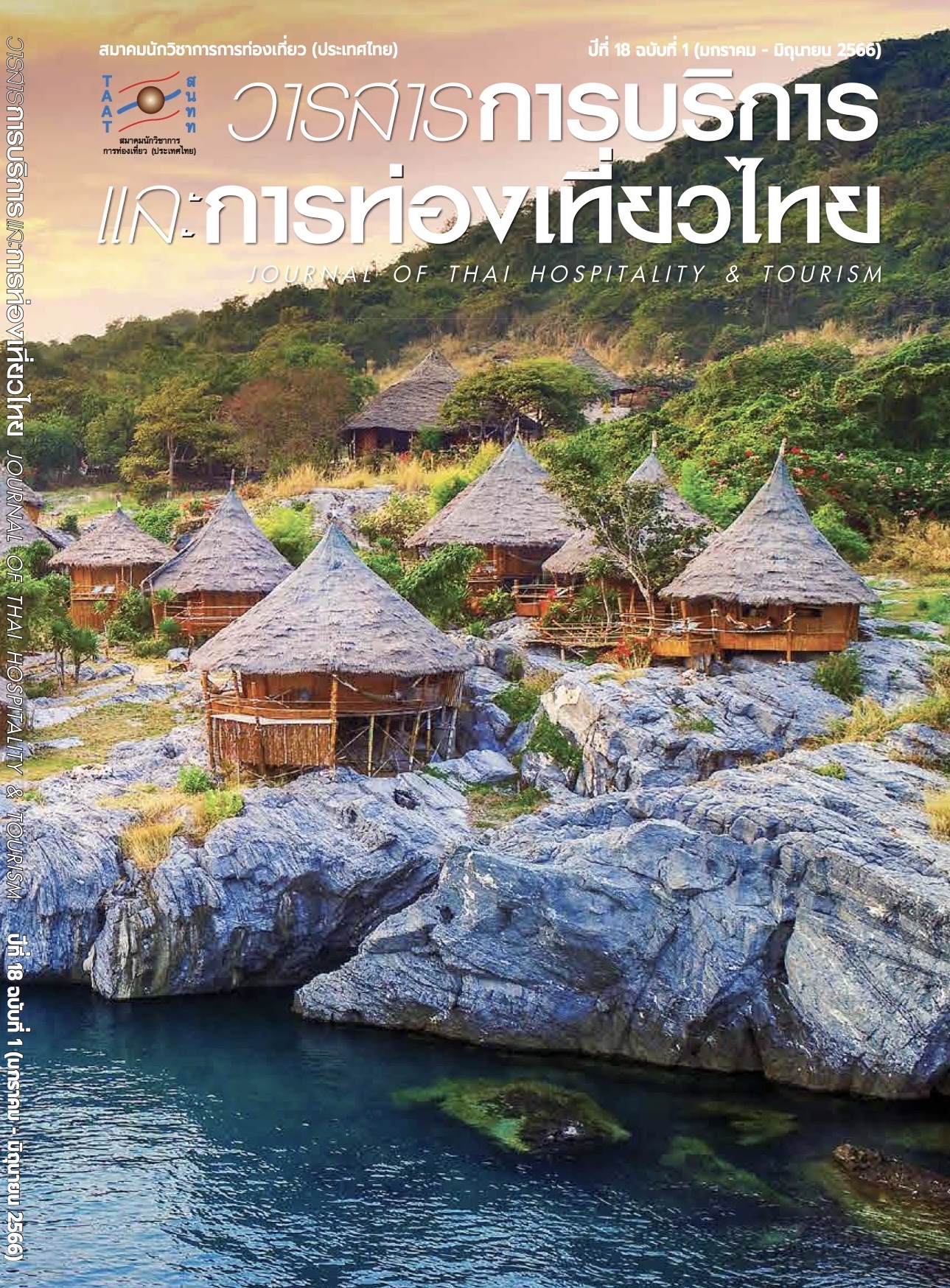พฤติกรรมการท่องเที่ยว ความกังวลในการเดินทางท่องเที่ยว การรับรู้ผ่านการสื่อสารแบบปากต่อปากบนเครือข่ายอินเทอร์เน็ต และความตั้งใจเดินทางท่องเที่ยวภายหลังการแพร่ระบาดของโควิด-19 ของนักท่องเที่ยวชาวมุสลิม
Main Article Content
บทคัดย่อ
การวิจัยครั้งนี้เป็นการวิจัยเชิงปริมาณ มีวัตถุประสงค์เพื่อศึกษาพฤติกรรมการท่องเที่ยว ความกังวลในการเดินทางท่องเที่ยว การรับรู้ผ่านการสื่อสารแบบปากต่อปากบนเครือข่ายอินเทอร์เน็ต และความตั้งใจเดินทางท่องเที่ยวภายหลังการแพร่ระบาดของโควิด 19 ของนักท่องเที่ยวชาวมุสลิมที่อาศัยอยู่ในพื้นที่ 14 จังหวัดภาคใต้ของประเทศไทยจำนวน 400 คน โดยแบบสอบถามออนไลน์เป็นเครื่องมือในการเก็บรวบรวมข้อมูล และนำผลที่ได้มาวิเคราะห์ทางสถิติ โดยใช้สถิติเชิงพรรณนา ได้แก่ ค่าเฉลี่ย ส่วนเบี่ยงเบนมาตรฐาน ร้อยละ และสถิติเชิงอนุมาน โดยการทดสอบตรวจสอบปัจจัยที่มีผลต่อความตั้งใจเดินทางภายหลังการแพร่ระบาดของโควิด 19 ด้วยการวิเคราะห์สมการถดถอยพหุคูณแบบเป็นขั้นตอน
ผลการวิจัยพบว่า ภายหลังการแพร่ระบาดของโควิด 19 นักท่องเที่ยวชาวมุสลิมค่อนข้างที่จะมุ่งเน้นเรื่องความปลอดภัยในการเดินทางท่องเที่ยวเป็นสำคัญ อีกทั้งระดับความคิดเห็นเกี่ยวกับการรับรู้ผ่านการสื่อสารแบบปากต่อปากบนเครือข่ายอินเทอร์เน็ต และความตั้งใจเดินทางท่องเที่ยวอยู่ในระดับมาก ในขณะที่ความกังวลในการเดินทางท่องเที่ยวอยู่ในระดับน้อย จากการวิเคราะห์สมการถดถอยพหุคูณแบบเป็นขั้นตอนพบว่า ความกังวลในการเดินทางท่องเที่ยว ค่าใช้จ่ายในการเดินทางท่องเที่ยว การรับรู้การสื่อสารแบบปากต่อปากบนอินเทอร์เน็ต ระยะเวลาการท่องเที่ยวต่อครั้ง และระยะเวลาที่จะเดินทางท่องเที่ยวภายหลังการแพร่ระบาดของโควิด 19 ส่งผลต่อความตั้งใจในการเดินทางท่องเที่ยวอย่างมีนัยสำคัญทางสถิติ ในบริบทของข้อเสนอแนะหน่วยงานภาครัฐและเอกชนด้านการท่องเที่ยวควรให้ความสำคัญในด้านความปลอดภัยและความสะอาด ตลอดจนผู้ประกอบการภาคการท่องเที่ยวควรเสริมสร้างความประทับใจเชิงบวก และจัดเตรียมสิ่งอำนวยความสะดวกให้เพียงพอต่อการรองรับนักท่องเที่ยวชาวมุสลิม
Article Details

อนุญาตภายใต้เงื่อนไข Creative Commons Attribution-NonCommercial-NoDerivatives 4.0 International License.
เอกสารอ้างอิง
Abdullah, M., Ali, N., Hussain, S. A., Aslam, A. B. & Javid, M. A. (2021). Measuring Changes in Travel Behavior Pattern due to COVID-19 in a Developing Country: A Case Study of Pakistan. Transport Policy, 108(c), 21–33.
Ahn, J. C., Cho, S. P. & Jeong, S. K. (2013). Virtual Reality to Help Relieve Travel Anxiety. KSII Transactions on Internet and Information (TIIS), 7(6), 1433–1448.
Albarq, A. N. (2013). Measuring the Impacts of Online Word-of-Mouth on Tourists’ Attitude and Intentions to Visit Jordan: An Empirical Study. International Business Research, 7(1), 14–22.
Alvandi, E., Dellazenda. & Sihombing, S. O. (2020). Testing Travel Intention Model: An Empirical Study of Borobudur Temple. Jurnal Manajemen, 24(2), 327–341.
Bangkokbiznews. (2020). Booking.com Reveals the Trend of Thai Tourists’ Behavior after COVID-19. https://www.bangkokbiznews.com/news/detail/909641
Carlson, K. D. & Herdman, A. O. (2012). Understanding the Impact of Convergent Validity on Research Results. Organizational Research Methods, 15(1), 17–32.
Chiangphan, N. & Vongsaroj, R. (2017). Factor Affecting to the Travel Behavior of the Foreign Female Tourist in Bangkok. Journal of International and Thai Tourism, 13(2), 105–123.
Cochran, W. G. (1953). Sampling Techniques. John Wiley and Sons.
Elsayeh, Y. (2020). Post COVID-19: Potential Effects on Egyptians’ Travel Behavior. Global Journal of Management and Business Research: (F) Real Estate, Event, Tourism Management & Transporting, 20(3), 24–31.
Fakharyen, M., Jalilvand, M. R., Elyasi, M. & Mohammadi, M. (2012). The Influence of Online Word-of-Mouth Communications on Tourists’ Attitudes toward Islamic Destinations and Travel Intention: Evidence from Iran. African Journal of Business Management, 6(38), 10381–10388.
Hashim, N. A. A. N., Noor, M. A. M., Awang, Z., Aziz, R. C. & Yusoff, A. M. (2018). The Influence of Tourist Perceived Risk towards Travel Intention: A Conceptual Paper. International Journal of Academic Research in Business and Social Sciences, 8(16), 92–102.
Hsu, P. Y., Ku, E. C. S., Lai, T. C. & Hsu, S. (2022). Developing a Muslim Tourism Market: the Perspective of Travel Agencies. Journal of Hospitality and Tourism Insights, 5(1), 166–185.
Jalilvand, M. R., Esfahani, S. S. & Samiei, N. (2011). Electronic Word-of-Mouth: Challenges and Opportunities. Procedia Computer Science, 3, 42–46.
Jittijarunglap, K. (2019). The Impact of Electronic Word-of-Mouth on Online Shopping Behavior. Journal of Information Systems in Business, 5(2), 43–65.
Krungthai Compass. (2020). Penetrating Tourist Behavior in the New Normal: When COVID Comes, Life Changes. Krungthai.
Luo, J. M. & Lam, C. F. (2020). Travel Anxiety, Risk Attitude and Travel Intentions towards “Travel Bubble” Destinations in Hong Kong: Effect of the Fear of COVID-19. International Journal of Environmental Research Public Health, 17(21), 7859.
Makhdoomi, U. M. & Baba, M. M. (2019). Destination Image and Travel Intention of Travellers to Jammu & Kashmir: the Mediating Effect of Risk Perception. Journal of Hospitality Application & Research, 14(1), 35–56.
Ministry of Tourism and Sports (MOTS). (2021). Tourism Statistics 2021. https://mots.go.th/more_news_new.php?cid=628
Reisinger, Y. & Mavondo, F. (2005). Travel Anxiety and Intentions to Travel Internationally: Implications of Travel Risk Perception. Journal of Travel Research, 43(3), 212– 225.
Saenkam, B. (2021). The Behavior of Thai Tourists after COVID 19 Situations. Journal of Liberal Arts and Service Industry, 4(1), 160–167.
Saenyen, T., Sirijaruanan, T., Haso, A. & Khattangchon, S. (2018). Marketing Trend in Friendly Muslim Tourism. Journal of Pacific Institute of Management Science, 4(1), 286–297.
Srithammasak, N. & Akkapin, S. (2018). The Study of Foreign Tourists Behavior towards Taling–Chan Floating Market. Journal of Thai Hospitality and Tourism, 13(1), 27–35.
Taherdoost, H. (2016). Validity and Reliability of the Research Instrument: How to Test the Validation of a Questionnaire/Survey in a Research. International Journal of Academic Research in Management, 5(3), 28–36.
Viangin, S. (2016). The Study of Factors Positively Affecting Intention to Travel of the Visitors of “Thai-Teaw-Thai” Event. Bangkok University.
Vinijvorakijkul, N., Sae–Wang, R. & Kanchanakhuha, W. (2018). Human Capital Development in Tourism Industry in the ASEAN Framework. Kasem Bundit Journal, 19(1), 45–60.
Zarrad, H. & Debabi, M. (2015). Analyzing the Effect of Electronic Word-of-Mouth on Tourists’ Attitude toward Destination and Travel Intention. International Research Journal of Social Sciences, 4(4), 53–60.


